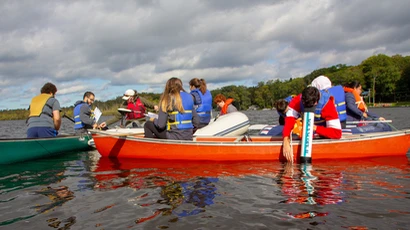
During my junior and senior years at Fredonia I was involved in a research project under the mentorship of Dr. Scott Ferguson in the fields of molecular biology and genetics. The thing that surprised me about this endeavor was how much it helped me to realize who I was as a scientist, a learner, and a teammate and how much it truly prepared me for the roads ahead.
My research project was an exploration into the development and application of a novel technique, Trimolecular Fluorescence Complementation (TriFC), for the visualization of protein-mRNA interactions in real time in living Drosophila (fruit fly) ova. For this project, several unique DNA constructs were engineered, which fell into three categories. The first: a specific protein of interest (Squid in our case) harboring a truncated fluorescent protein half. The second: an mRNA strand (grk) known to bind the protein of interest, with an experimentally added stem loop motif. Finally, the third complex featured an MCP viral protein (known to bind stem loops) adjacent to the remainder of the truncated fluorescent protein. These constructs were transgenically incorporated into the genetic makeup of several Drosophila lines in order to induce the production of their respective proteins. The fundamentals of this technique lie in a phenomenon called complementation. The fluorescent proteins we chose are non-fluorescent when separated into truncated domains, yet spontaneously recombine (complement) to yield fluorescence when oriented close to one another. Thus, it was our theory that the florescence would act as a marker for when and where grk mRNA and Sqd protein were interacting within the living ova. Indeed, after examination via confocal microscopy, fluorescence was revealed that corresponded to patterns expected for the Sqd-grk system. These exciting results supported the efficacy of this technique, and made me the first person to utilize TriFC in the model organism Drosophila. In the upcoming years this experimentation will be repeated under the capable hands of my former colleagues, using altered parameters based on flaws in method that I helped to find, to improve the technique. The ultimate goal is that our Drosophila TriFC protocol will be perfected and available for use worldwide by scientists eager to examine protein-mRNA interactions in real time in an inexpensive and easy to culture living model organism.
I shared this information with an admissions board professor during my interview at the University of Buffalo School of Medicine. He seemed impressed, and most of the interview was spent discussing my research. The very next day I received a letter from UB and ecstatically shared the news with my family that, out of 4000 applicants, I was one of only 144 accepted to medical school.
I could not be happier with the training I received during my two years of research at Fredonia because of how much it prepared and benefited me for the future. Dr. Ferguson respected our research team as capable and professional colleagues, and put emphasis on working both as individuals and with our team. As a result, I established deep and lifelong friendships in my lab mates, learned to collaborate with others, expanded my scientific mind and ability to think critically, and grew as an individual learner. Furthermore, it is likely that a publication with my name as one of the authors will serve as another tangible benefit in the near future.
I have come to realize, after just two weeks of medical school, that these attributes will continue to help me throughout my career. An uncontrollable smile spread across my face on the third day of class as our professor stated that research experience, and ideally publication, in medical school is one of the most important factors in obtaining a good residency, and a strong undergraduate research background would widen the window of research opportunities in the years to come. Consequently, I have recently been meeting with my professors about starting research at the medical school this school year and summer, and potentially applying for the MD/PhD program. My prospects are already promising.
The benefits of my undergraduate research will extend far beyond the next few years. The medical world is changing, and these days doctors are expected to know about genetics and molecular biology, and medical students are expected to be experienced and comfortable with performing research. Furthermore, to be a successful physician one must function both individually as a scientist and collaboratively with his team, and he must think critically, quickly, and sharply for his patient’s sake. My research experience at Fredonia has already planted the seeds for this necessary personal growth.
I was fortunate to have such a wonderful and beneficial research opportunity right at my fingertips. I am grateful to the caring and invested professors in the biology department at Fredonia, who do a wonderful job providing their students with scientifically relevant, legitimate, and progressive scientific research opportunities. I will forever hold the memories of my research at Fredonia close in heart and mind.
Steven Gangloff
B.S. in Biology, Class of 2012
University of Buffalo School of Medicine, Class of 2016

